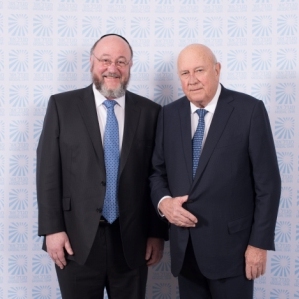
Lifestyle/Community

De Klerk and Mirvis – both steeped in the soil of Africa
SHIRA DRUION
Founded more than 42 years ago by Rabbi Yitzchak Dovid Grossman, winner of the Israel Prize and recipient of the Presidential Medal of Distinction, Migdal Ohr (Tower of Light) assists 12 000 orphaned, abandoned, impoverished and immigrant children across Israel annually. This is done through its 160 youth clubs and three main campuses.
Migdal Ohr provides indigent children with an outstanding education, loving home, clothing, food, medical care, psychological counselling and recreational activities from birth through to childhood.
The graduates of Migdal Ohr have gone on to become productive Israeli citizens, and are among Israel’s top doctors, lawyers, community leaders, army generals and one is even a member of the Knesset.
Migdal Ohr’s dinner organiser, Assaf Admoni said: “Following Rabbi Grossman’s visit to South Africa last June (as the guest of Chief Rabbi Warren Goldstein at the Sinai Indaba) it was decided that we should endeavour to partner with local South African causes.
We approached the FW de Klerk Foundation with the idea of raising funds for children at risk in Israel and South Africa and we are delighted that the idea has come to fruition.”
Chief Rabbi of the United Kingdom, Rabbi Ephraim Mirvis, attended the event and with charisma held the stage alongside former South African President and Nobel Laureate FW de Klerk.
Aurum CEO, expat Kevin Gundle, interviewed them in a panel discussion that brought to the fore priceless anecdotes from a bygone era.
The two men gave their views on leadership and spoke candidly of their pastsand how it had influenced them to go into politics and the rabbinate respectively.
De Klerk had the audience chuckling when he commented: “I grew up quite differently to the rabbi.” He spoke of growing up in a very political home which was still obsessed with anger towards the British (after the Anglo-Boer War of 1899 – 1902).
“We were preoccupied with becoming an independent republic. In this whole process, obviously we neglected the position of people of colour in South Africa. What moved me to make the changes that I did, were not sanctions, but the admission that our dream of so many independent states of which all Africans could get their political rights, landed up in failure.
“We realised that and that the idea to succeed through separateness would fail and that we needed to embrace inclusivity.”
Chief Rabbi Mirvis spoke of the very disturbing comparison between apartheid in South Africa and Israel and how Jews have a responsibility to fight against the evil slur against their homeland.
De Klerk said: “The two greatest challenges with which the world is grappling is the plight of those in abject poverty and being able to cope with diversity.
He also tackled the need to live in a society that embraced diversity as has been done in South Africa. He said: “Leaders should take initiatives to change the status quo. All of us have a deep inherent fear of fundamental change. It’s easier to go in the ways that you are used to. So, unless you take quantum leaps and create new realities, old conflicts will not be resolved.”
“It was a privilege to interview Chief Rabbi Mirvis and Mr De Klerk,” Gundle commented. “Here are two men who share a common South African heritage, but where the context of their upbringing shaped two very different men. Both went on to have a significant impact on communities and in the case of Mr De Klerk, transforming a country.”




